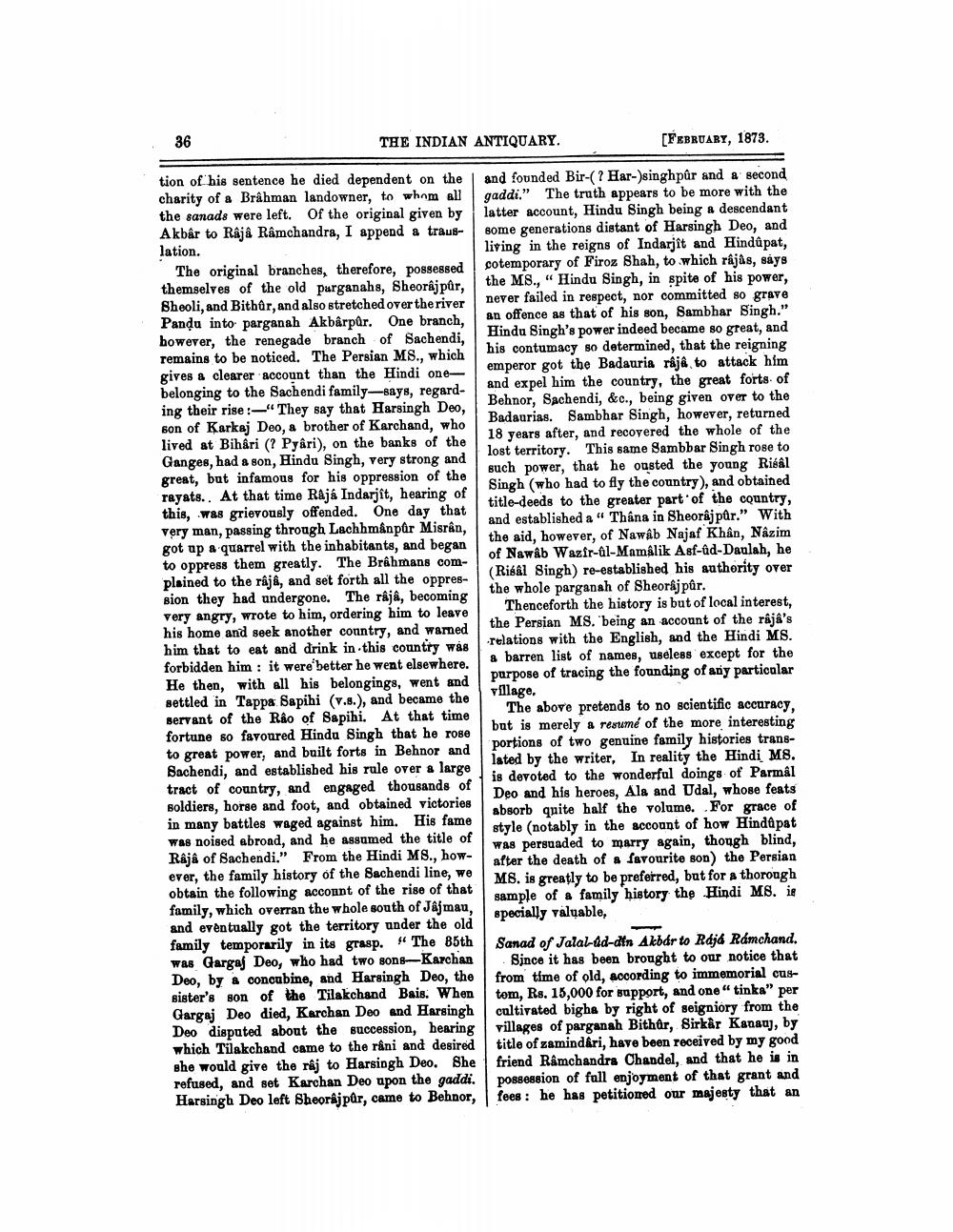________________
36
THE INDIAN ANTIQUARY.
[FEBRUARY, 1873.
tion of his sentence he died dependent on the charity of a Brâhman landowner, to whom all the sanads were left. Of the original given by Akbar to Raja Ramchandra, I append a traus- lation.
The original branches, therefore, possessed themselves of the old parganahs, Sheorajpur, Shooli, and Bithûr, and also stretched over the river Pandu into parganah Akbarpur. One branch, however, the renegade branch of Sachendi, remains to be noticed. The Persian MS., which gives a clearer account than the Hindi one belonging to the Sachendi family-Bays, regarding their rise :-“They say that Harsingh Deo, son of Karkaj Deo, a brother of Karchand, who lived at Bihari (? Pyari), on the banks of the Ganges, had a son, Hindu Singh, very strong and great, but infamous for his oppression of the rayats.. At that time Râjá Indarjít, hearing of this, was grievously offended. One day that very man, passing through Lachhmânpar Misran, got up & quarrel with the inhabitants, and began to oppress them greatly. The Brahmans complained to the râjâ, and set forth all the oppresBion they had undergone. The râja, becoming very angry, wrote to him, ordering him to leave his home and seek another country, and wamed him that to eat and drink in this country was forbidden him : it were better he went elsewhere. He then, with all his belongings, went and settled in Tappa Sapihi (v.s.), and became the servant of the Râo of Sapihi. At that time fortune so favoured Hindu Singh that he rose to great power, and built forts in Behnor and Bachendi, and established his rule over a large tract of country, and engaged thousands of soldiers, horse and foot, and obtained victories in many battles waged against him. His fame was noised abroad, and he assumed the title of Raja of Sachendi." From the Hindi MS., however, the family history of the Sachendi line, we obtain the following account of the rise of that family, which overran the whole south of Jajmau, and eventually got the territory under the old family temporarily in its grasp. “The 85th was Gargaj Deo, who had two song-Karchan Deo, by a concubine, and Harsingh Deo, the sister's son of the Tilakchand Bais. When Gargaj Deo died, Karchan Deo and Harsingh Deo disputed about the succession, hearing which Tilakchand came to the râni and desired she would give the raj to Harsingh Deo. She refused, and set Karchan Deo upon the gaddi Harsingh Deo left Sheoraj pôr, came to Behnor,
and founded Bir-( ? Har-)singhpûr and a second gaddi." The truth appears to be more with the latter account, Hindu Singh being a descendant some generations distant of Harsingh Deo, and living in the reigns of Indarjît and Hindupat, cotemporary of Firoz Shah, to which râjâs, says the MS., "Hindu Singh, in spite of his power, never failed in respect, nor committed so grave an offence as that of his son, Sambhar Singh." Hindu Singh's power indeed became so great, and his contumacy so determined, that the reigning emperor got the Badauria râjâ to attack him and expel him the country, the great forts of Behnor, Sachendi, &c., being given over to the Badaurias. Sambhar Singh, however, returned 18 years after, and recovered the whole of the lost territory. This same Sambbar Singh rose to such power, that he ousted the young Ribal Singh (who had to fly the country), and obtained title-deeds to the greater part of the country, and established a "Thâna in Sheoraj pûr." With the aid, however, of Nawab Najaf Khân, Nazim of Nawab Wazir-ul-Mamâlik Asf-ud-Daulah, he (Ribal Singh) re-established his authority over the whole parganah of Sheoråjpûr.
Thenceforth the history is but of local interest, the Persian MS. being an account of the raja's relations with the English, and the Hindi MS. a barren list of names, useless except for the purpose of tracing the founding of any particolar village.
The above pretends to no scientific accuracy, but is merely a resumé of the more interesting portions of two genuine family histories translated by the writer, In reality the Hindi MS. is devoted to the wonderful doings of Parmál Deo and his heroes, Ala and Udal, whose feats absorb quite half the volume. For grace of style (notably in the account of how Hinda pat was persuaded to marry again, though blind, after the death of a favourite son) the Persian MS. is greatly to be preferred, but for a thorough sample of a family history the Hindi MS. is specially valuable, Sanad of Jalal-ud-din Akbar to Rdja Ramchand.
Since it has been brought to our notice that from time of old, according to immemorial custom, Rs. 15,000 for support, and one“ tinka" per cultivated bigha by right of seigniory from the villages of parganah Bithür, Sirker Kanany, by title of zamindári, have been received by my good friend Ramchandra Chandel, and that he is in possession of full enjoyment of that grant and fees : he has petitioned our majesty that an




